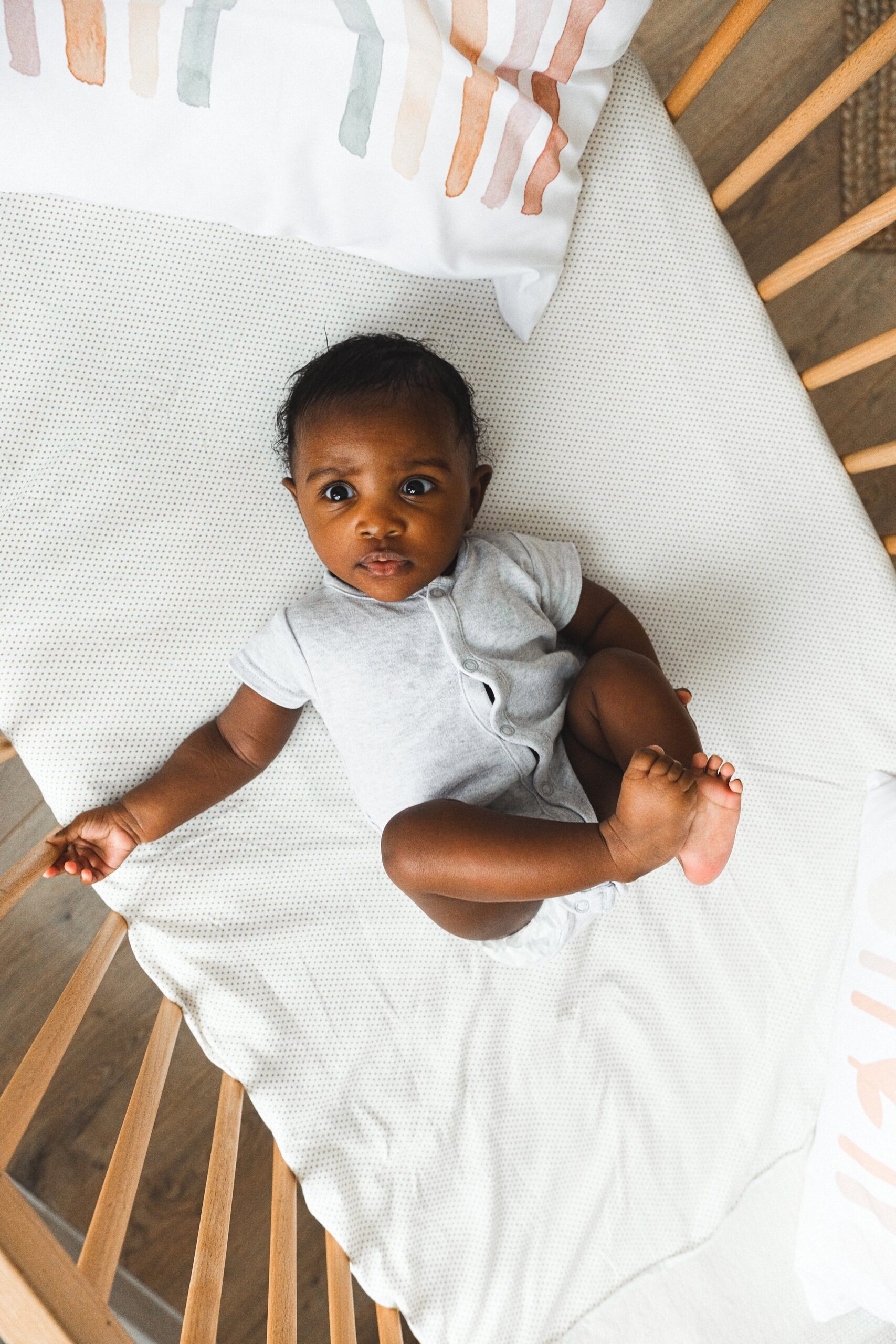I'm Rachael
Mom of 3 & Baby Sleep Expert with Big Sis Energy
& I’VE DONE ALL THE RESEARCH FOR YOU ALREADY.
Better sleep for the entire family
BROWSE COURSES
hey!
Bedtime Battles in Babies and Toddlers
Is your baby or toddler fighting you at bedtime? This is such a common problem and can be so frustrating for everyone involved. There are a few things that could be going on and it is not always easy to tell. Let’s talk about what fighting sleep actually looks like and some common reasons.
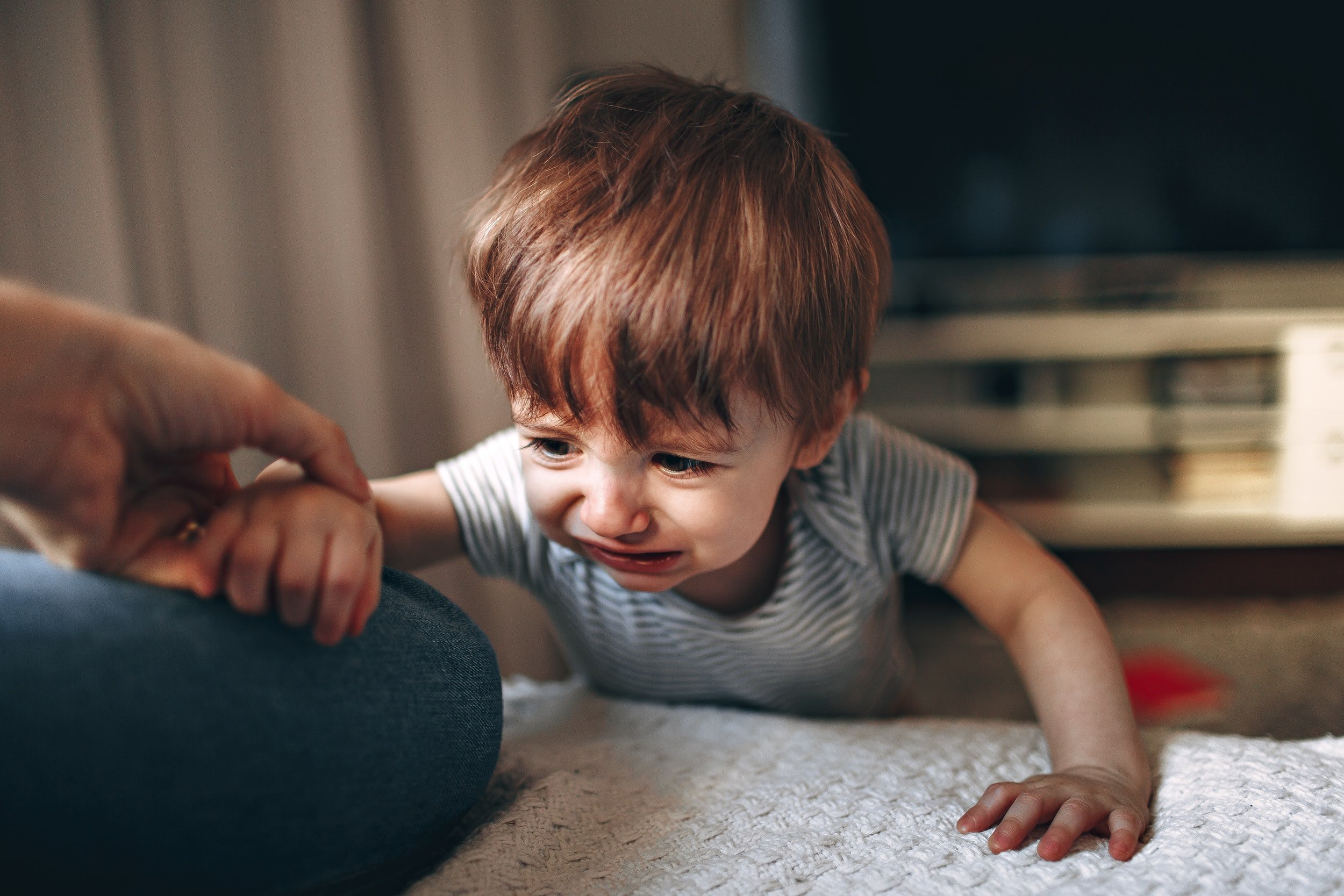
What might Bedtime Battles look like?
This can vary from baby to baby. But what’s described to me (and what I have experienced myself!) in babies is…
-
VERY upset and fussy or even inconsolable baby
-
Lots of crying, whining or even screaming when you enter the sleep space
-
Arching their back/going stiff, pushing off of you, scratching, etc.
-
Baby might almost fall asleep and then jerk back awake and become very upset all over again (“fighting” sleep).
In toddlers it might look like….
-
Refusing bedtime
-
Tons of requests for more water, more books, one more song, begging you to stay etc.
-
Fussiness, grumpiness, etc. even when you know they are tired
-
Doing things to try and get your attention, or becoming very clingy
-
Talking about fears, showing anxiousness about going to bed, or full blown tantrums

What’s up with this?
Well, young children don’t really “fight” sleep. Sleep naturally comes to humans when we are ready for it and when our system isn’t overloaded with stress. So something else is causing them to not feel that they are safe to fall asleep, and to some degree this is very normal. It’s normal for our babies and young children to not want to be separated from us. However, there are some things we can try tweaking or investigating to make things easier:
-
Environmental/ Comfort– something is too stimulating, bright, noisy, itchy, hot, cold, etc. or baby is gassy, sick, teething, in pain, etc. Be sure your environment is calming and that they are comfortable.
-
Scheduling Issues– baby could be undertired and truly not ready for sleep yet, or extremely overtired and fussy or getting ready for a “second wind” becoming hyperactive and hard to settle
-
Parent Stress– this one is HUGE. If we are stressed or anxious about bedtime or naps, our baby will 100% pick up on this. Babies are really good at tuning into our emotions, they rely on this for co-regulation of their own emotional state. So if we are stressed, baby is stressed. This will eventually teach them that sleep is not a safe or comfortable place to be.
-
Separation Anxiety– babies naturally want to be near us ALL. THE. TIME. When they can sense a separation about to happen (like going into their crib) they become very vulnerable and their state of alarm is activated. This can cause stress which of course makes it very hard to fall asleep.
-
Temperament/ Sensory– Some children just take a bit longer to wind down in the evening and need more chill time before bed or a bit more support to fall asleep.
The more a child is separated from us during the day, the more frantically they might be seeking that connection when we are together. For lots of us though, if we work all day we are only seeing our children for a couple of hours in the evening. The rush of dinner and all the household chores can make it seem impossible to really connect with our child They can sense this and it sends them into full alarm when we separate at bedtime. In the evening, try and be really intentional with connecting with your little one so that they can have a full “connection cup” come bed time.
some things to do to help with bedtime separation anxiety in toddlers and young children
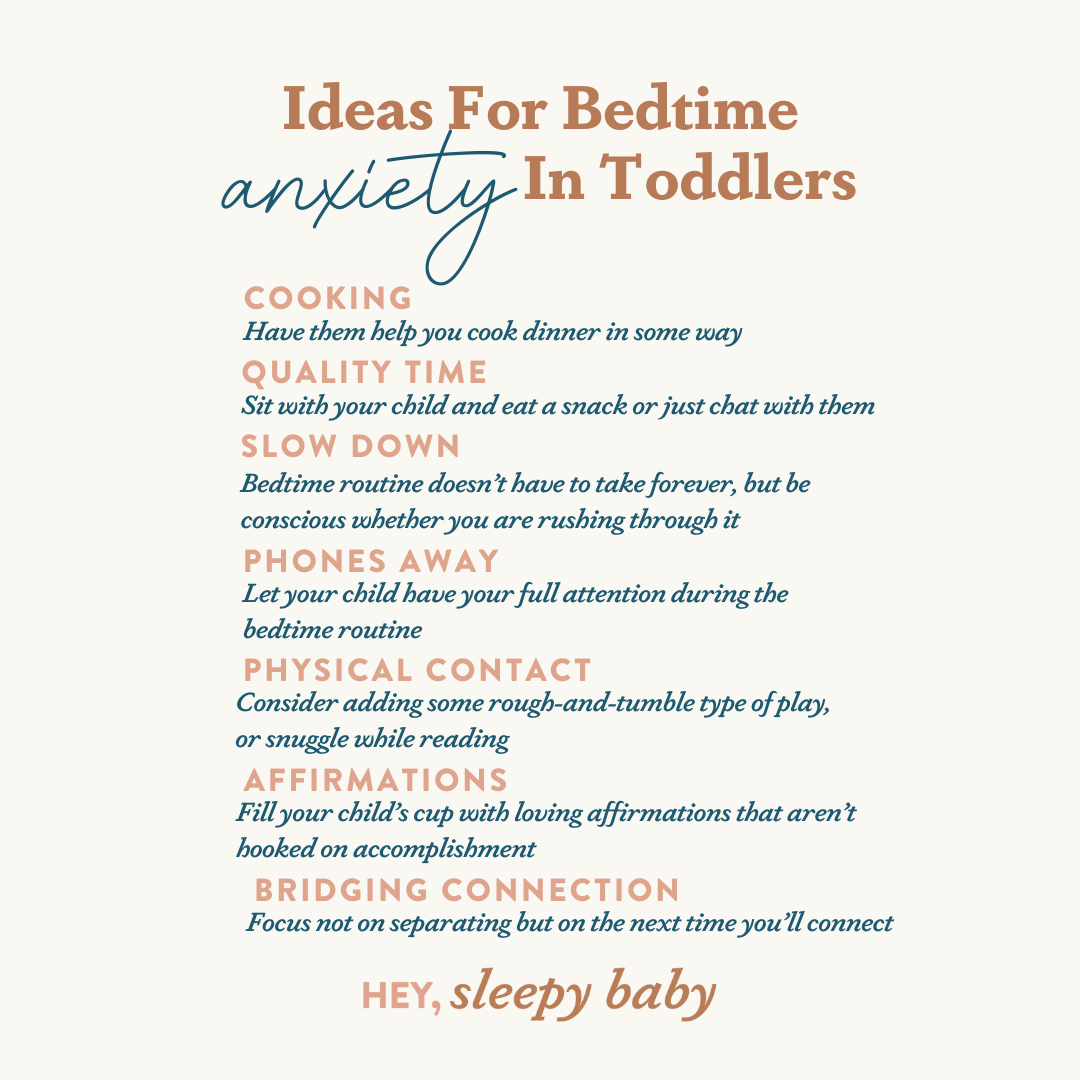
-
Cooking- Have them help you cook dinner in some way
-
Quality time– Sit and eat together! Even if you and your partner eat later, sit with your child and eat a snack or just chat with them.
-
Slow down– Bedtime routine doesn’t have to take forever, but be conscious whether you are rushing through it. Our kids can pick up on this energy and will resist even more.
-
Phones away- Let your child have your full attention during the bedtime routine.
-
Physical contact- Consider adding some rough-and-tumble type of play, or snuggle while reading, so that your child gets lots of physical contact from you.
-
Affirmations- Fill your child’s cup with loving affirmations that aren’t hooked on accomplishment ex: “I was missing you and thinking about you all day!” or “I love reading books with you” or “you make me so happy”
-
Bridging connection- Focus not on separating but on the next time you’ll connect. You could tell your child that you will be checking on them throughout the night, that you’re right next door / down the hall, etc., that you’ll see them in your dreams, etc. and then talk about what you’ll do together when you wake up.
-
Mantras- Add in some mantras you say together like “I am safe, I am cozy, mommy is here.”
-
Photos- Give your child a photo of you to keep under their pillow, by their bed, etc.
-
Smell- Give them a t-shirt that smells like you or another special lovey to remind them of you.
other things you can try
-
Sensory support– Rough and tumble play and laughter before starting the bedtime routine can get lots of extra energy out and can serve as a way to connect as well!
-
Physical activity/ outside time during the day– Young children crave sensory stimulation, and the best way to get this is with lots of free movement and play plus exploration of the outdoors during the day or before the bedtime routine.
-
Tweaking the routine- For some, bath time is very upsetting or stimulating. Or there might be something else that bugs them in the evening. Try to cater your routine to your unique child vs. doing things you think you “should” do. The routine should be calming and connecting, not stressful.
-
Role Play– Practice the bedtime routine at another time of day when you can be playful and role play with your child or use their toys to show how bedtime goes
-
Visuals- For toddlers, visual routine charts can be helpful for them to see exactly what’s going to happen, and makes the routine feel predictable, which makes them feel safe
-
Choices- Where you can, give your child some power and agency. Let them choose from 2 pairs of PJs or let them pick out 3 books.
It is super important to remain CALM and fill up your child’s cup with connection instead of rushing, getting flustered, or focusing on the separation. Remember, ABC for your nighttime routine to go more smoothly:
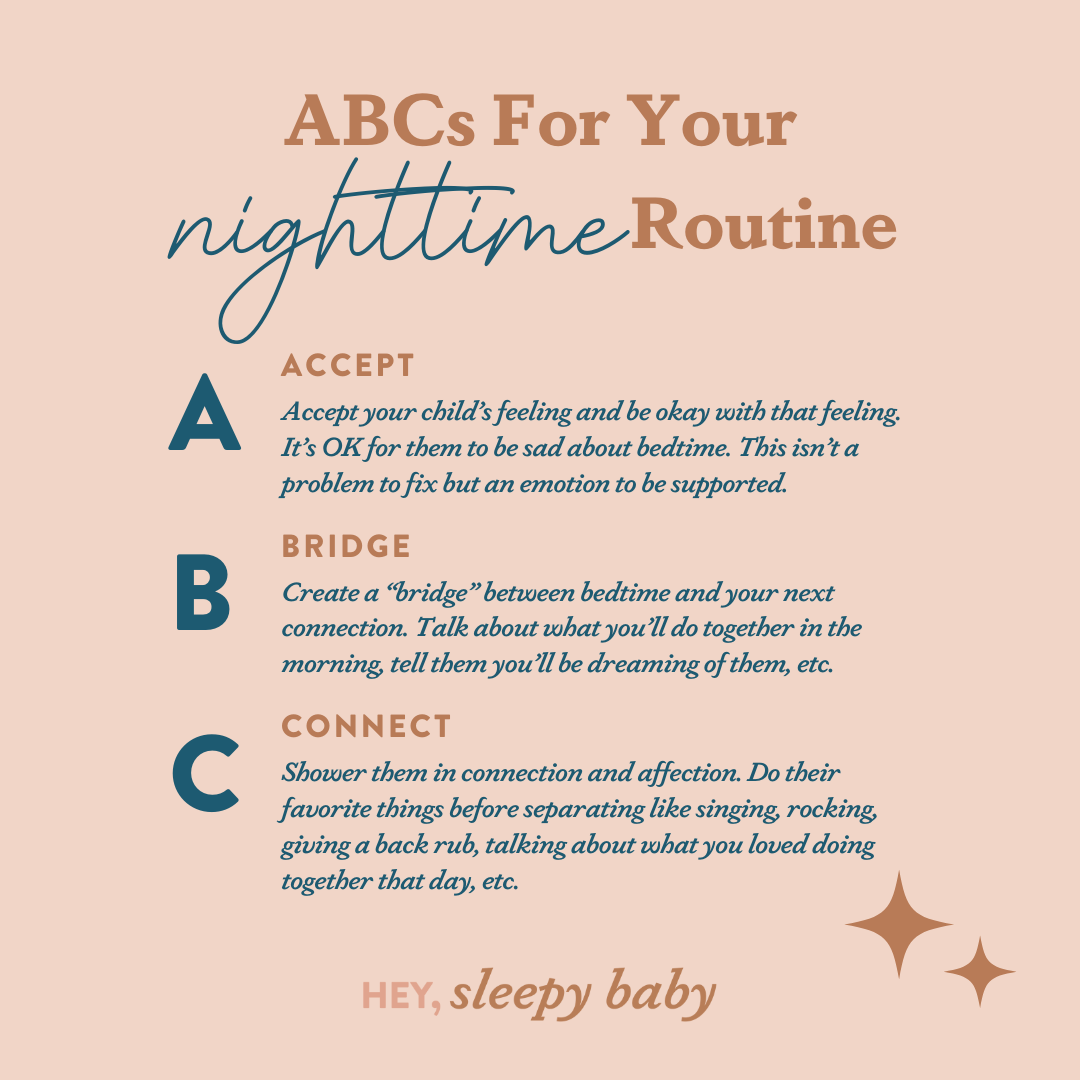
A- ACCEPT
Accept your child’s feeling and be okay with that feeling. It’s OK for them to be sad about bedtime. This isn’t a problem to fix but an emotion to be supported.
B- BRIDGE
Create a “bridge” between bedtime and your next connection. Talk about what you’ll do together in the morning, tell them you’ll be dreaming of them, etc.
C- CONNECT
Shower them in connection and affection. Do their favorite things before separating like singing, rocking, giving a back rub, talking about what you loved doing together that day, etc.
It can be SO draining when the bedtime routine is less reading and singing and more crying and fighting. It doesn’t have to be this way… stay kind, stay firm, stay calm, and stay consistent. If you are struggling with coping strategies, talking with a therapist is always a great idea. If your baby is nursing to sleep and is fighting at the breast, PLEASE, check things out with a lactation consultant. It could make the difference!
For more on supporting Toddlers at bedtime and throughout the night, check out my Better Bedtimes Guide.
Was this helpful? Save it for later!
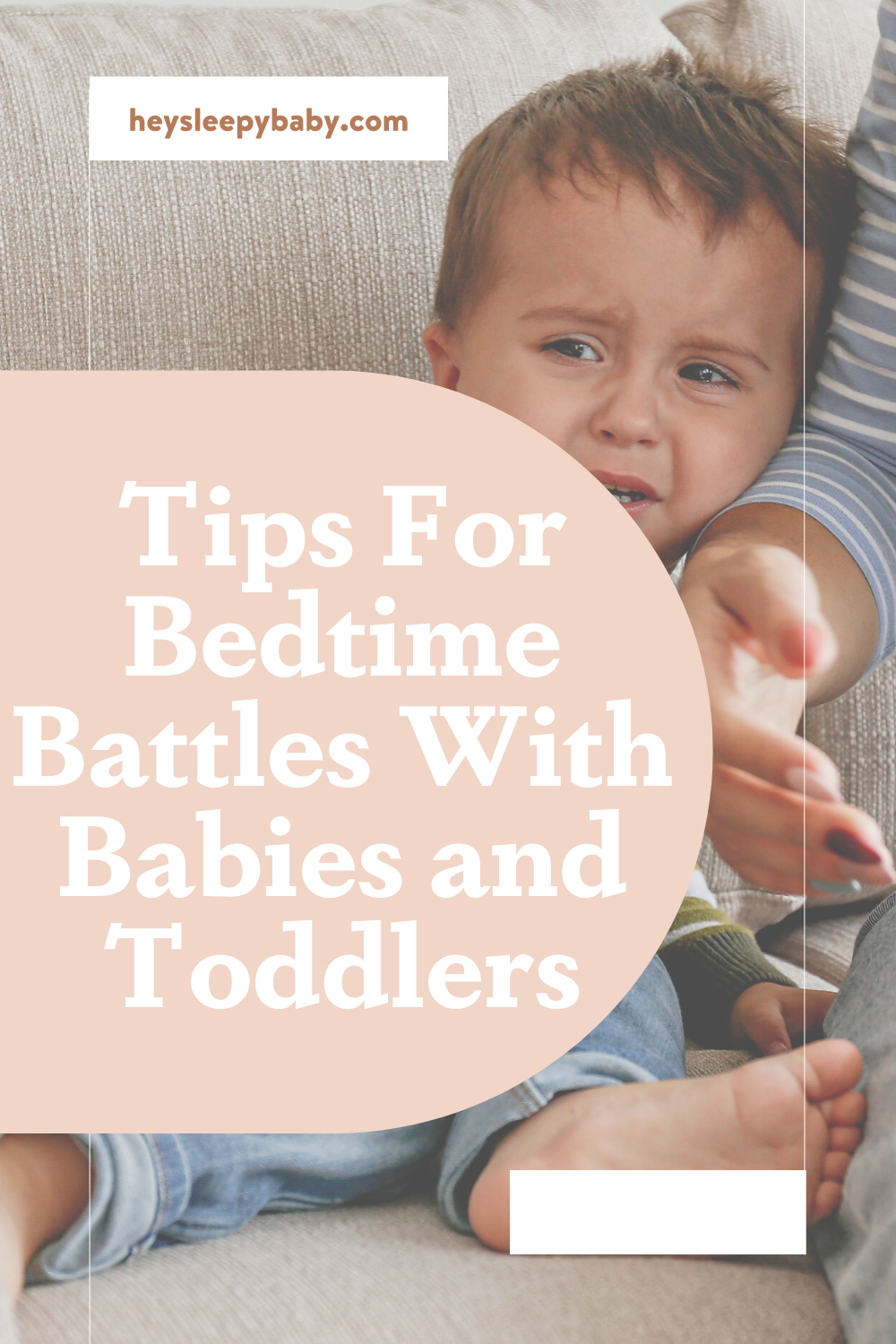
binge reads
We think you'll love these
You deserve to the
baby stage, not just "survive it."
And you DON'T have to sacrifice your values, ignore your instincts, or force yourself to follow a method you don't align with just to get your baby back to sleep.
I’m here to help you create a restful, sustainable sleep environment that honors both your baby’s needs AND your own (without the stress OR the guilt!) because, no, you don’t have to choose between the two.
enjoy!
BABY SLEEP COURSES →
BABY SLEEP CONSULTS →
Wish you could help your baby sleep better without resorting to sleep training? Download my FREE guide to a good night’s sleep and learn 8 simple, science-backed tips for supporting your child’s needs.
Traditional sleep training methods don’t have to be your solution to better sleep.
SLEEP TRAINING ISN’T THE ONLY WAY TO GET GOOD SLEEP
Hey, I'm Rachael and Hey, Sleepy Baby is for parents who want to get their nights back, without sleep training their babies.
NO ONE TOLD US POD
explorING the untold truths of parenting


